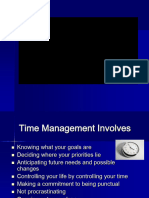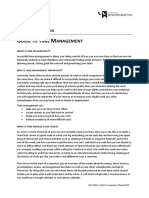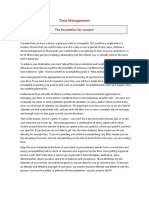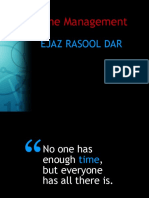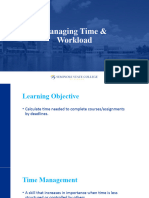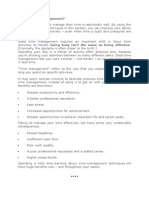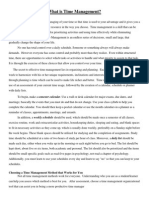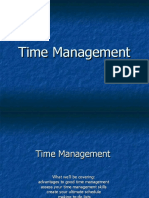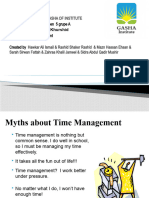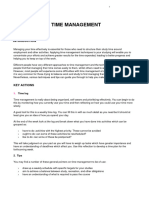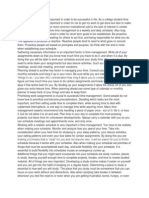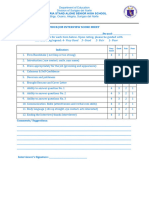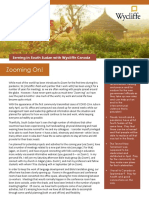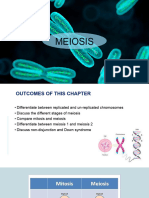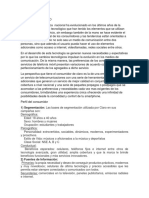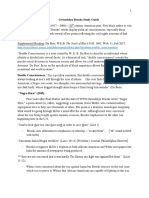University of Mosul
College of Education
Department of English
Methods of Research Writing
(Second seminar)
A seminar on:
Time Management
Course Instructor: Dr. Omar
Prepared by: Yasseen Moslih Khalaf
Contents:
Introduction
What is time management?
Types of time management personalities
Time management tools and strategies
Good working habits for time management
Symptoms of not getting started on tasks
Ten tips for getting started on academic tasks and meeting deadlines
Practical tips for managing your time
Conclusion
References
1
� Introduction.
Time management is all about what to do, and when to do it, and how much time
you will allocate for doing it. In this paper I am going to shed light on some types of
personalities in terms of managing time, and the tools which might offer a great help
for organizing you activities. How to know that you are putting off tasks and how to
begin them well. Finally, some practical and useful tips are given.
What is time management?
Time management is by definition, the ability of organizing your time so you could
optimize the benefits you get out of it. Paradoxically, the busiest you are, the less you
get done. Hence, to be able to do more and better, you need to be master of your time
and not vice versa. Kristin Hughes(2020)
Types of time management personalities.
The late-nighter: Luke likes to work into the night. His draft chapter is due
tomorrow morning, but he couldn’t get down to doing it earlier
on. It’s 2.00 a.m. and he’s panicking. The library’s shut, so he
can’t find a reference to support one of his points; he’s so
tired he won’t be able to review his writing and correct
punctuation and grammatical errors; he’ll probably miss the
9.00 a.m. deadline . . . his chapter can be ‘polished’ later.
He’d be better to get some sleep and proof-read early in
the morning.
The extension-seeker: Elaine always rationalizes being late with her draft submissions.
She always has good reasons for being late, and it’s never her
fault. This time her printer packed up just before submission,
last time she had tonsillitis and the time before she had to visit
her granny in hospital. This is beginning to wear rather thin
with her supervisor . . . her project is front-loaded with detail,
but weak in the analytical sections.
The last-minuter: Lorna is a last-minute person and she can only get motivated
when things get close to the wire. She produces her best work
close to deadlines when the adrenaline is flowing. However,
her final-year dissertation is supposed to be a massive
10,000 words, there’s only two weeks to go and she hasn’t felt
nervous enough to get started until now . . . the time she would
need to structure a well-organized dissertation has expired.
2
�The know-it-all: Kevin has it all under control. He thinks that the literature
is all on the internet or in e-journals, so there’s no need to get worked up about this
project. He’ll catch up on his sleep
and his social life; he’ll run off the report over the weekend.
Trouble is that his university doesn’t subscribe to the journals
he’ll need and that means that he can only read the abstracts
or summaries, not the full text . . . at the weekend the library
will be closed and so he’ll not be able to get hold of any of the
books . . . his project is going to be weak on in-depth analysis.
The perfectionist: Pat wants to do really well at university. She signed up for a
vocational degree and has plans to land a plum job on
graduation to start her climb up the career tree. She did really
well in her assignments and it’s vital that the project report
that she’s working on starts with a cracking first sentence.
Just can’t phrase it right though – she’s tried 15 different ways
and crossed them all out. Time is running out now . . . the
quality of the analytical section and conclusion is bound to
suffer.
Time management tools and strategies:
Organizing your activities more carefully is an obvious way to gain
productive time.
1. Diaries
Use a diary to keep track of your day-to-day schedule (for example,
meetings, lectures, sports activities) and to note submission deadlines
for university work including that for your dissertation or project report.
Work your way back from key dates, creating milestones such as
‘finish library work for research’ or ‘prepare first draft of section 1’.
Refer to the diary frequently to keep yourself on track and to plan
out each day and week. Try to get into the habit of looking at the
next day’s activities the night before and the next week’s work
at the end of the week. A diary with the ‘week-to-view’ type of
layout such as the ‘Smarter Student Planner’ will enable you to
plan over the longer term.
Number the weeks, so you can sense how time is progressing over longer
periods, such as a term or semester.
3
� Choosing a diary
Some universities and many bookshops sell academic diaries that
cover the year from September to August. This format helps you
keep track of the numbered weeks in each semester or term, and to
highlight draft or final submission dates for your written work.
2. Timetables
Create a detailed timetable of work to make sure you take into
account all aspects of the work you have to complete by:
● breaking the task down into smaller parts;
● spacing these out appropriately;
● scheduling important work for when you generally feel most intellectually active
(e.g. mid-morning).
One advantage of a timetable is that you can see the progress you
are making if you cross out each mini-task as it is completed.
3. Wall planners
These are another way of charting out your activities, with the advantage
that you can see all your commitments and deadlines at a glance.
Advantages of being organized
If you organize your time well, you will:
● keep on schedule and meet your submission deadline;
● complete work with less pressure and fulfill your potential;
● build your confidence about your ability to cope;
● avoid overlapping commitments and having to juggle more than
one piece of work at a time.
Being organized is especially important for large or long-term tasks
because it seems easier to put things off when deadlines seem distant.
Listing and prioritizing
At times you may run into problems because you have a number
4
�of different tasks that need to be done. It is much better to write
these tasks down as a list each day, rather than risk forgetting them.
You will then have a good picture of what needs to be done and
will be able to priorities the tasks more readily.
Once you’ve created a list, rank the tasks by numbering them 1, 2, 3
and so on, in order from ‘important and urgent’ to ‘neither important
nor urgent’ (see Figure 1.). Your ‘important’ criteria will depend on
many factors: for example, your own goals and submission dates.
Figure 1. The urgent–important
approach to prioritizing. Place
each activity somewhere on the
axes in relation to its importance
and urgency.
Distinguishing between important and urgent activities.
Importance implies some assessment of the benefits of completing a task against
the loss if the task is not finished.
Urgency relates to the length of time before the task must be completed.
Each day, you should try to complete as many of the listed tasks
as you can, starting with number one. If you keep each day’s list
achievable, the process of striking out each task as it is completed
provides a feeling of progress being made, which turns into one of
satisfaction if the list has virtually disappeared by the evening. Also,
you will become less stressed once high-priority tasks are tackled.
Carry over any uncompleted tasks to the next day, add new ones to
your list and start again – but try to complete yesterday’s unfinished
jobs before starting new ones of similar priority, or they will end up
5
�being delayed for too long.
This technique works well for practical aspects of researching. Once
you get to the writing-up phase of your dissertation or project report,
it becomes less easy to apply list-making on the writing task itself.
However, keeping lists of non-writing things you need to do helps
you to deal with this items separately and so keep your mind free
to focus on the writing in progress.
Good working habits for time management
● Do important work when you are at your most productive.
Most of us can state when we work best . When you
have worked this out for yourself, timetable your activities to suit:
academic work when you are ‘most awake’ and routine activities
when you are less alert.
● Make the most of small scraps of time. Use otherwise
unproductive time, such as when commuting or before going to
sleep, to jot down ideas, edit work or make plans. Keep a notebook
with you to write down your thoughts.
● Keep your documents organized. If your papers are well filed, then
you won’t waste time looking for something required for the next step.
● Make sure you always have a plan. Often, the reason projects don’t
go well is because there is no scheme for the work. Laying out a plan
for any academic research or writing helps you to clarify the likely
structure behind your efforts. Writing out a fairly detailed plan saves
you time in the long run. It is also an aid to consolidating your thinking.
● Extend your working day. If you can deal with early rising, you
may find that setting your alarm earlier than normal provides
a few extra hours to help you achieve a short-term goal.
Time period Alertness rating
8:oo to 12:00 am
12:00 to 4:00 pm
Figure 2. Are you a morning,
4:00 to 8:00 pm afternoon or night person? Rate
yourself (marks out of 10)
9:00 to 1:00 according to when you find yourself
pm/am most able to study productively.
Symptoms of not getting started on tasks
6
� People agree that one of the hardest parts of time management is
getting started on tasks. Putting things off – procrastination – is all too
easy, and can involve the following:
● convincing yourself that other low-priority work is more important
or preferable;
● switching frequently among tasks, and not making much progress in
any of them;
● talking about your work rather than doing it;
● planning for too long rather than working;
● having difficulty starting a piece of writing (‘writer’s block’);
● spending too long on presentational elements (for example, the
cover page or a diagram), rather than the ‘meat’ of the project;
● finding mundane TV programs fascinating or being easily
persuaded to go out socializing.
Good time managers recognize when to finish tasks, even if the task
is not in a ‘perfect’ state. At university, doing this can mean that
the sum of results from multiple assignments is better, because
your attention is divided more appropriately, rather than focusing
on a single task.
Ten tips for getting started on academic tasks and meeting deadlines
1. Improve your study environment. Your focus and concentration will depend
on this.
● Create a tidy workplace. Although tidying up can be a symptom of
procrastination, in general it is easier to start studying at an empty desk
and in an uncluttered room.
● Reduce noise. Some people like background music, while others don’t –
but it’s generally other people’s noise that really interrupts your train of
thought. A solution might be to go to a quiet place like a library.
● Escape. Why not take all you need to a different location where there will be
a minimum of interruptions? Your focus will be enhanced if the task you
need to do is the only thing you can do, so take with you only the notes and
papers you require.
2. Avoid distractions. If you are easily tempted away from study by your friends,
you’ll have to learn to decline their invitations politely. Hang up a ‘do not
disturb’ sign, and explain why to your friends; disappear off to a quiet location
without telling anyone where you will be; or switch off your phone, TV or
email. One strategy might be to say to friends ‘I can’t come just now, but how
about having a short break in half an hour?’
3. Work in short bursts while your concentration is at a maximum. After this,
give yourself a brief break, perhaps a short walk, and then start back again.
4. Find a way to start. When writing, finding a way to start is a very common
7
�problem because of the perceived need to begin with a ‘high impact’ sentence
that reads impressively. This is unnecessary, and starting with a simple
definition or restatement of the issue or problem is perfectly acceptable.
If you lack the motivation to begin work, try thinking briefly about the bigger
picture: your degree and career, and how the current task is a small but
essential step to achieving your goals.
5. Focus on the positive. You may be so anxious about the end point of your
task that this affects your ability to start it. For example, many students are
so nervous about the apparent difficulty, or prospect, of writing a dissertation
or project report that they freeze in their preparation and put the whole
thing off. One way to counter this would be to think about the aspects of the
work ahead that excite you – doing the research, experiments or field work.
Once you become immersed in your research topic the writing will become
less daunting.
6. In written tasks, don’t feel you have to tackle the writing in a linear fashion.
Word-processing software allows you work out of sequence, which can help
get you going. So, for a large report, it might help to start on a part that is
‘mechanical’, such as a reference list or results section. Sometimes it’s a good
idea to draft the summary, abstract or contents list first, because this will give
you a plan to work to.
7. Cut up large tasks. If you feel overwhelmed by the size of the job and this
prevents you from starting it, break the task down to manageable, achievable
chunks. Then, try to complete something every day. Maintaining momentum in
this way will allow you to whittle away the job in stages.
8. Work alongside others. If you arrange to work alongside others, you can spur
each other on with sympathy, humor and the promise of a break after each
study period.
9. Ask for help. You may feel that you lack a particular skill to attempt some
component of the task (for example, the ability to use a statistics program)
and that this is holding you back. Don’t be afraid to ask for help, rather than
suffering in isolation: consult a fellow student, lecturer, or skills adviser; or
visit one of the many websites that offer assistance.
10. Don’t be a too much of a perfectionist. We all want to do well, but doing your
very best takes time – a commodity that should be carefully rationed so that
all tasks are given their fair share. Perfectionism can prevent or delay you
getting started if you feel your initial efforts need to be faultless (see point 4
above). Also, achieving fault-free work requires progressively more effort, with
less return as you get nearer to perfection. The time you need to spend to
attain the highest standards will probably be better used on the next task.
8
� Practical tips for managing your time
Invest in items to support your time management. Helpful items
could include a diary, wall planner, personal digital assistant (PDA),
mobile phone with diary facility and alarm clock.
Investigate how you really use your time. Time-management
experts often ask clients to write down what they do for every minute
of several days and thereby work out how and where the productive
time disappears. If you are unsure whether you are optimizing time
you might like to keep a detailed record for a short period, using a
suitable coding for your activities. When you have identified any time
that has been less productive you could try analyzing how this has
happened. Those of a more numerical bent might wish to construct
a spreadsheet to do this and work out percentages spent on different
activities. Once you have completed your timesheet, appraise it to see
whether you spend excessive amounts of time on any one activity or
may not have the balance right. As you think about this, remember
that universities assume you will be carrying out academic-related
activities for roughly 40 hours per week.
Create an artificial deadline. Set yourself a finishing date that is
ahead of the formal submission deadline for your dissertation or
project report. That way you will have the luxury of time to review
your work, correct errors and improve the quality of presentation.
Build flexibility into your planning. We often end up rushing things
because the unexpected has interrupted a timetable that is too tightly
scheduled. To avoid this, deliberately introduce empty slots into your
plans to allow for these contingencies.
Try to prioritize the items on your ‘to do’ list. If you produce a
daily list of tasks, then spend some time thinking about how you wish
to prioritize and order them through the day. You might adopt a
numerical system or one using stars, for example.
Ask yourself whether your lifestyle needs radical surgery. You may
find that little in this chapter seems relevant because your time is
dominated by a single activity. This might be socializing, caring for
others, outside employment or travelling, for example. In these cases,
you may need to make fundamental changes to your lifestyle to place
greater emphasis on your studies. In some cases a student counselor
might be able to help you identify what needs to be done.
9
� Conclusion
To manage your time in a proper way, you have to recognize the traits of your own
character. Knowing your tasks and how to prioritize them is crucial. Creating a
good environment and avoiding distraction supports your working process and
organizing your life leads to time management.
References
1. Kathleen McMillan and Jonathan Weyers. (2011. P. 29-39) How to write
dissertations and project reports / 2nd ed.
2. https://images.app.goo.gl/TxjL8pcdFqJDLVX28(1)
11
